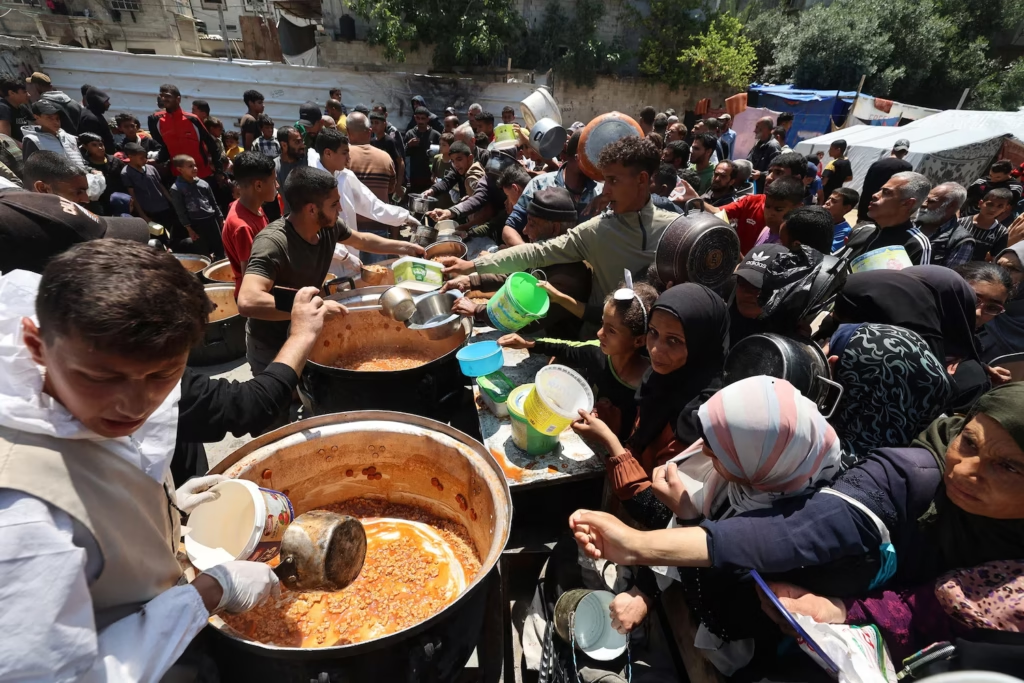The humanitarian crisis in Gaza has reached critical levels as Israel’s blockade on humanitarian aid enters its third month. The Israeli government justifies the blockade as a strategic move to pressure Hamas to release the remaining 59 hostages and accept a proposed extension of a ceasefire deal that ended on March 18. Despite official claims that humanitarian personnel are permitted to enter Gaza, the situation on the ground remains catastrophic.
Noah Isaiah Wells Obituary: McIntosh, AL
Dire Shortages of Food, Water, and Medical Supplies
Basic necessities such as food, clean water, medicine, and vaccines are in dangerously short supply. Aid workers report that most families are surviving on a single daily meal, often limited to canned food and bread. The skyrocketing cost of food has made even the most basic items unaffordable for the majority of Gaza’s population.
According to Osama As, leader of Mercy Corps Gaza Emergency Response Program, food insecurity is worsening daily. “Most people cannot afford the remaining items,” he said. “Prices are simply out of reach for most families.”
Children at Risk: Malnutrition on the Rise
Children are among the most vulnerable victims of the crisis. Severe malnutrition cases are increasing, with babies and young children suffering the most. Dr. Ahmed Alfar of Nasser Hospital in Khan Younis shared the story of Siwar, a four-month-old girl now weighing only six pounds — a dangerous drop from her healthy birth weight of 2.5 kilograms. Her mother, unable to breastfeed, has resorted to feeding her sweetened water.
Jonathan Crickx of UNICEF Palestine emphasized the urgency of delivering nutritional aid. “If food, water, and vaccines are not brought in at scale, we will see more preventable child deaths,” he warned.
Healthcare System on the Verge of Collapse
Hospitals in Gaza are overwhelmed and critically under-resourced. Medical staff are being forced to perform surgeries without adequate pain relief due to a lack of anesthetics and surgical supplies. “We are having to ration medications,” said Dr. Aqsa Durrani from Médecins Sans Frontières (MSF). “The conditions are unacceptable, and we are making impossible decisions every day.”
Crickx added that essential antibiotics and materials for treating the injured are nearly depleted, making it impossible to provide even basic medical care.
Disease Outbreaks Fuel the Crisis
Overcrowded shelters, poor sanitation, and a lack of clean water have created fertile ground for disease outbreaks. Scabies, lice, and vaccine-preventable illnesses like hepatitis A, measles, chickenpox, and polio are spreading rapidly.
Limited access to hygiene products and vaccines has left the population defenseless. “We need more medical supplies and urgent support to contain these outbreaks,” said Dr. Durrani.
Psychological Toll on the Population
Beyond the physical hardships, the psychological toll is profound. Families live in constant fear and uncertainty. Pregnant women face high-risk pregnancies with limited prenatal care, and newborns are brought into a world where basic survival is not guaranteed.
“Even in these conditions, babies are being born,” said Dr. Durrani. “We urgently need more vaccinations, medical resources, and global attention to protect the most vulnerable.”
A Call for International Action
Humanitarian organizations like UNICEF, MSF, and World Central Kitchen are doing all they can, but their efforts are constrained by the blockade and dwindling resources. Without international intervention, the situation will continue to deteriorate.
Conclusion: The World Must Act Now
The humanitarian crisis in Gaza is a growing tragedy that demands immediate international attention. The blockade must be lifted to allow the entry of life-saving aid — including food, water, medical supplies, and vaccines. The people of Gaza, especially its children, are facing unimaginable suffering.
The world cannot afford to turn away. Now is the time for collective global action to prevent further loss of life and to restore hope to a population in crisis. The people of Gaza are counting on urgent support — and the international community must respond without delay.

